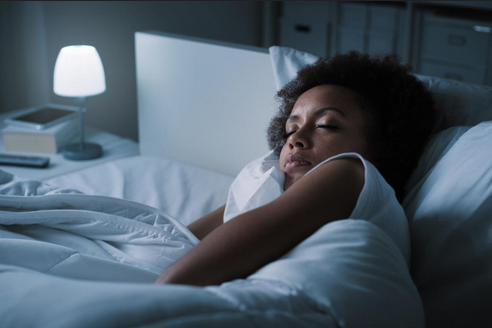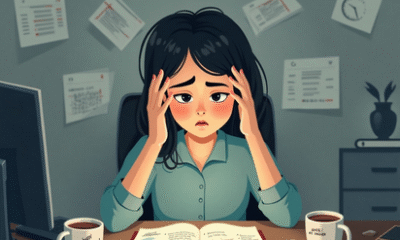LIFESTYLE
Why Women Need More Sleep Than Men: The Science Explained
Published
4 days agoon
By
Verified
Why Women Need More Sleep Than Men: The Science Explained
Sleep is essential for everyone, but studies have found that women generally need more sleep than men. While the difference might only be 20 minutes on average, it reflects deeper biological and psychological reasons. Let’s explore the science behind this surprising fact.
1. Multitasking and Brain Usage
Women are often natural multitaskers. According to sleep researchers, the more your brain is used during the day, the more rest it needs to recover. Women tend to engage in complex cognitive tasks that involve switching between roles—caregivers, professionals, planners—all in one day. This increased mental activity leads to a higher need for restorative sleep.
2. Hormonal Differences
Hormonal fluctuations from menstrual cycles, pregnancy, and menopause significantly impact women’s sleep quality. These changes can cause insomnia, night sweats, and disrupted sleep patterns. As a result, women require more sleep to counterbalance these hormonal disruptions.
3. Higher Risk of Sleep Disorders
Women are more likely than men to suffer from sleep disorders such as insomnia and restless leg syndrome. These conditions can reduce sleep efficiency, meaning that women need additional sleep to make up for the poor-quality rest they often get.
4. Mental Health and Emotional Processing
Women are statistically more prone to anxiety and depression—both of which affect sleep patterns. Sleep plays a critical role in emotional regulation and mental health. To support overall wellness, women may require more deep sleep to help their brains process emotions and stress.
5. Quality vs. Quantity
It’s not just about getting more hours—it’s about better quality sleep. Women may spend more time in light sleep or wake more frequently during the night. Extending sleep duration helps ensure they get the full benefits of REM and deep sleep cycles.
On average, adults need 7–9 hours of sleep per night. For women, aiming for the upper end of that range or slightly more—especially during hormonal transitions or high-stress periods—can make a big difference in mood, memory, and physical health.
Understanding why women need more sleep than men helps promote better health practices and empathy in relationships. Prioritizing sleep isn’t a luxury—it’s a necessity. Whether you’re managing a household, a career, or both, making room for rest should always be on the agenda………CONTINUE READING
You may like
LIFESTYLE
4 Harmful Effects of Eating Bread Every Day That May Affect Your Health
Published
1 day agoon
June 4, 2025
Bread is a staple food in many homes, but eating it regularly—especially in excess—can have negative effects on your health. Whether white or processed bread, here are four potential dangers of daily bread consumption:
Blood Sugar Spikes and Crashes
Most commercial breads, especially white bread, are high in refined carbohydrates that quickly convert to sugar in the body. This causes sudden spikes in blood sugar, followed by energy crashes. Over time, this may increase your risk of developing type 2 diabetes.Weight Gain
Bread is calorie-dense and often eaten in large quantities. Regular intake, especially without portion control, can contribute to weight gain due to its high carb content and low fiber. This is even more pronounced with sweetened or buttery bread products.Digestive Issues
Many breads contain gluten—a protein that can cause bloating, gas, or discomfort in people with gluten sensitivity or intolerance. Even for those without a diagnosed condition, daily bread consumption can sometimes lead to sluggish digestion.Increased Risk of Heart Problems
Highly processed bread often contains added sugars, sodium, and unhealthy fats. Consistently eating these types of bread may raise your cholesterol levels and increase your risk of heart disease…….CONTINUE READING
LIFESTYLE
5 Life-Changing Morning Habits to Boost Your Productivity and Happiness
Published
1 day agoon
June 4, 2025
The way you start your morning sets the tone for the rest of your day. Adopting these simple but powerful habits can drastically improve your mindset, productivity, and long-term success:
Wake Up Early
Waking up earlier gives you quiet time to focus, plan, and prepare before the world gets busy. It reduces stress and gives you control over your day.Practice Gratitude
Spend a few minutes thinking or writing about what you’re thankful for. Gratitude boosts your mood and trains your brain to focus on the positive.Exercise or Stretch
Even a 10-minute walk, light stretch, or quick workout boosts your energy, improves your focus, and wakes up your body.Plan Your Day
Write down your top goals or tasks for the day. This gives your day purpose and helps you stay organized and productive.Avoid Your Phone for the First Hour
Checking social media or emails first thing can overwhelm your mind. Start with calm, intentional activities before diving into digital distractions.
These habits take just a few minutes but can shift your entire day—and your life—toward better health, clarity, and productivity. Start small and stay consistent…….CONTINUE READING
LIFESTYLE
Why Women Need More Sleep Than Men, According to Science
Published
2 days agoon
June 3, 2025
Science shows that women typically need more sleep than men, and it’s not just a stereotype—it’s backed by brain research and sleep studies.
Women Use More of Their Brain at Once
According to sleep experts, women are better multitaskers. This means they use more areas of the brain simultaneously during the day. That extra mental load results in greater need for recovery time during sleep.Hormonal Fluctuations Affect Sleep
Hormonal changes during menstruation, pregnancy, and menopause can disrupt sleep patterns. These cycles make women more likely to experience insomnia or lighter sleep, increasing the need for quality rest.Women Are More Prone to Sleep Disorders
Studies show women are more likely to suffer from conditions like restless leg syndrome, insomnia, and anxiety-related sleep problems—making restful sleep more difficult to achieve.Sleep Affects Emotional and Mental Health More Strongly in Women
Sleep deprivation has a greater impact on women’s mood and cognitive function than in men. Poor sleep can increase the risk of depression, irritability, and low energy levels.Science Recommends 20 More Minutes of Sleep
Experts from Duke University suggest that women may need about 20 extra minutes of sleep per night to allow the brain to fully recover from daily demands.
In summary, women often juggle more complex cognitive and emotional tasks daily, leading to a genuine biological need for more sleep. Listening to your body and prioritizing rest isn’t laziness—it’s science-backed self-care………CONTINUE READING
Trending

 Uncategorized1 week ago
Uncategorized1 week agoSilent Killer Diseases Every Woman Should Be Aware Of

 Uncategorized1 week ago
Uncategorized1 week agoEveryday Habits That Are Silently Destroying Your Health and Happiness

 Uncategorized1 week ago
Uncategorized1 week agoWhat Causes Painful Periods and How You Can Get Relief

 EDUCATION1 week ago
EDUCATION1 week agoYou Can’t Have Two JAMB Results — The Old One Has Been Withdrawn

 Uncategorized1 week ago
Uncategorized1 week agoSigns That Indicate Your Heart Is Not Working Properly

 Uncategorized1 week ago
Uncategorized1 week agoCommon Reasons People Die In Their Sleep

 ENTERTAINMENT2 weeks ago
ENTERTAINMENT2 weeks agoNollywood actress, Tolani Akintunde dies of heart attack in the UK

 Uncategorized1 week ago
Uncategorized1 week agoSurprising Diseases Linked to Skipping Your Night Shower

